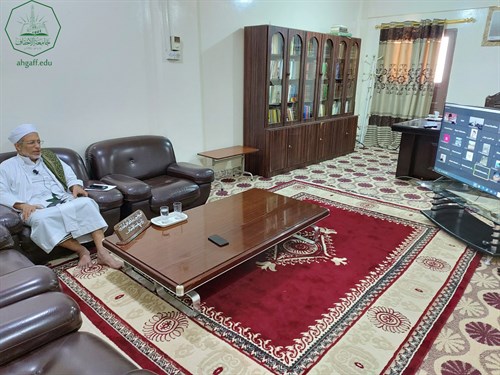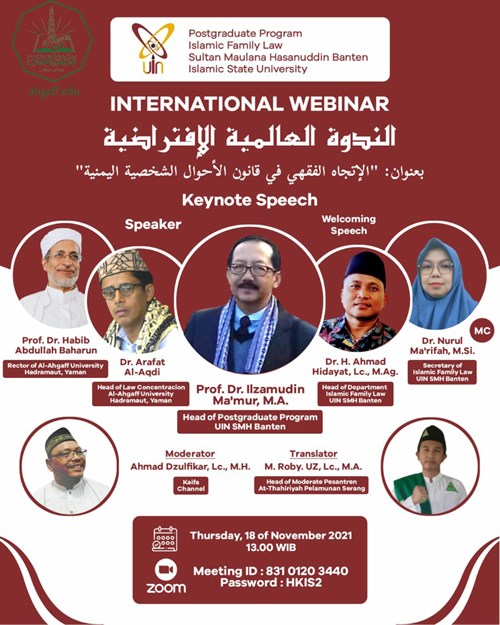The Chancellor of Al-Ahgaff University participates in the international symposium entitled “The Jurisprudential Trend in Yemeni Personal Status Law”
- 20/11/2021
- University News

Mukalla/ November 18, 2021/ University media
The Chancellor of Al-Ahgaff University, Professor Abdullah Muhammad Baharoon, participated in the international scientific symposium held by Sultan Maulana Hassanal-Din University in Indonesia, entitled “The Jurisprudential Trend in Yemeni Personal Status Law”, which was held via Zoom program and attended by a large number of science students from Indonesia, Yemen and other countries around the world.
Dr. Arafat Abdul Rahman Al-Maqdi, Vice Head of the Law Department at the Faculty of Sharia and Law, Al-Ahgaff University, participated in the event with the Chancellor of the University.
The Chancellor of the University spoke about the basis of legal legislation and its Islamic reference, which is concerned with the Qur’an and the Sunnah, and about the role of Islam with regard to family rights, explaining its details from the laws of marriage, divorce, care and childbearing, and its relationship to the texts contained in the Yemeni constitution.
He talked about the constitutional differences in the Yemeni law before 1990, as there were two countries with different regulations and legislative references, where the Arab Republic of Yemen (Northern Yemen) operated in the Zaidi and Shafi’i doctrines, while the People’s Democratic Republic of Yemen (South Yemen and followed by Hadramout) operated under the socialist system and its man-made laws derived from Marxism and Leninism fighting religious liberties.
Also, before 1967 and independence from British colonialism, Hadhramaut was divided into two sultanates, the Qu’aiti Sultanate (and its capital was Mukalla) and followed the Shafi’i school of thought with diligence (ijtihad) in some issues, and the Kathiri Sultanate (capital was Sayun), which follows the Shafi’i school of thought according to the references of the school.
He stated that the Yemeni law in general takes into account the Islamic law with regard to family law and civil status. He warned against the attempts of secularists to change the law in line with modern Western globalization in the name of women, children and human rights. In conclusion, he emphasized that the laws derived from the Qur’an and Sunnah have proven their strength and continuity and succeeded in preserving the family from disintegration and loss, unlike the man-made laws.
In his speech, Dr. Arafat Abdul Rahman Al-Maqdi spoke about the basis and classification of the Yemeni Personal Status Law, where he clarified that it is one of the branches of the private law with the civil law, and the text of the civil law in articles (2, 12, 18): The reference in interpreting and applying the texts of laws is Islamic jurisprudence. He mentioned the advantages of the Yemeni Personal Status Law, the most important of which is its comprehensiveness of gifts and vows, while the rest of the laws make gifts and vows related to the civil law. He mentioned applications of the Yemeni Personal Status Law; such as the judge’s annulment of marriage because of hatred, the marriage of a young woman, and the divorce associated with a small or large number of divorcing words, which counts as one divorce, and others. He explained that the jurisprudential trend in the Yemeni Personal Status Law is a mixture of various sects, some laws, and the opinions, preferences and judgments of some scholars. He cited the great role played by Al-Habib Abdullah bin Mahfouz Al-Haddad, head of the High Judicial Council in Hadhramaut, in reforming laws and his participation by the authority in developing its projects. He set the rationing controls in Hadhramaut according to the following reasons:
- Taking into account that the basis is the Shafi’i school of thought that has been in force in this country for centuries, and which is understood by judges, officials, muftis, and lawyers; The lawmaker, when drafting any law, should place it on the principles, rules, and decisions of the school, taking into account the necessity or need of other schools.
- Adhering to a school of thought and adherence to the opinion of one mujtahid in it is difficult and embarrassing, which is evident in the statements of other mujtahids; And even in the sayings of imams from other than this school, there is room to lift that embarrassment.
- Benefiting from the tolerance and ease of Sharia, and from the great legacy left to us by the mujtahids of the Islamic nation, especially with the change of times, the change of customs, and the events that took place, and the adoption of what is necessary to adopt in it other than what was settled on by the school that built its rule in its like on the custom of that era and its events.
- Seeking the help of the previous laws in the country, and in some other Arab and Islamic countries; to take from that, and from the comprehensive Islamic jurisprudence, what is required by necessity, or an interest appears in adopting it.






